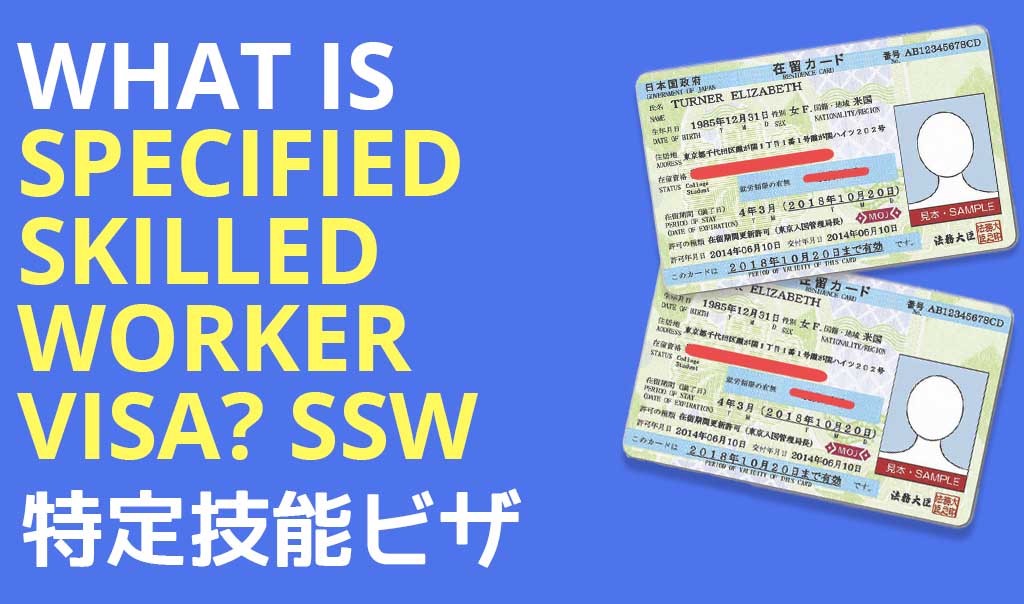In recent years, Japan has faced a significant labor shortage due to its aging population and declining birth rate. To address this issue, the Japanese government introduced the Specified Skilled Worker (SSW) visa in April 2019. This visa aims to attract skilled foreign workers to fill gaps in various industries. In this blog, we’ll explore what the SSW visa is, the benefits it offers, and how you can apply for it.
What is the SSW Visa?
The Specified Skilled Worker (SSW) visa is a new residency status created by the Japanese government to welcome foreign workers with specific skills. It is designed to address labor shortages in 14 key industries, including:
- Nursing care
- Building cleaning
- Machine parts and tooling
- Industrial machinery
- Electrical, electronics, and information industries
- Construction
- Shipbuilding and ship machinery
- Automobile repair and maintenance
- Aviation
- Hospitality
- Agriculture
- Fisheries
- Food and beverage manufacturing
- Foodservice
Types of SSW Visas
There are two types of SSW visas:
- SSW Visa Type 1:
- Valid for up to five years.
- Allows workers to be employed in one of the 14 specified industries.
- Requires basic Japanese language proficiency and skills relevant to the job.
- Does not permit family accompaniment.
- SSW Visa Type 2:
- Available after completing the Type 1 visa and demonstrating advanced skills.
- Allows workers to stay in Japan for an extended period, with the possibility of family accompaniment.
- Initially available only in the construction and shipbuilding industries, with plans to expand to other sectors.
Benefits of the SSW Visa
- Employment Opportunities: The SSW visa opens up numerous job opportunities in industries facing labor shortages.
- Competitive Wages: Workers can earn competitive wages and benefit from Japan’s high standard of living.
- Skill Development: The visa provides a chance to develop and enhance skills in a professional environment.
- Cultural Exchange: Living and working in Japan allows for rich cultural experiences and personal growth.
Eligibility Criteria
To be eligible for the SSW visa, applicants must:
- Pass the Skills Exams: Demonstrate the necessary skills for the specified industry by passing relevant exams.
- Pass the Japanese Language Proficiency Test (JLPT): Obtain at least an N4 level or pass the Japan Foundation Test for Basic Japanese (JFT-Basic).
- Meet Health Requirements: Undergo a medical examination to ensure fitness for work.
- Secure a Job Offer: Obtain a job offer from a Japanese employer willing to sponsor the visa.
Application Process
- Find a Job: Search for job opportunities in Japan that are open to SSW visa holders. Many employers and recruitment agencies can assist in this process.
- Prepare Documents: Gather necessary documents, including proof of skills, Japanese language proficiency, and a valid passport.
- Apply for Certificate of Eligibility (COE): The employer in Japan will apply for a COE on behalf of the applicant.
- Apply for the SSW Visa: Once the COE is issued, apply for the SSW visa at the Japanese embassy or consulate in your home country.
- Travel to Japan: After obtaining the visa, you can travel to Japan and begin your employment.
The SSW visa is an excellent opportunity for skilled workers to pursue rewarding careers in Japan. With its structured application process and clear benefits, it offers a viable solution to Japan’s labor shortages while providing valuable experiences for foreign workers. If you meet the eligibility criteria and are interested in working in one of the specified industries, the SSW visa could be your pathway to a fulfilling career in Japan.
For more information on the SSW visa and to stay updated on the latest developments, visit the official websites of the Japanese government and relevant industry bodies.


